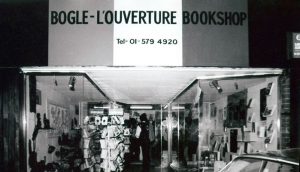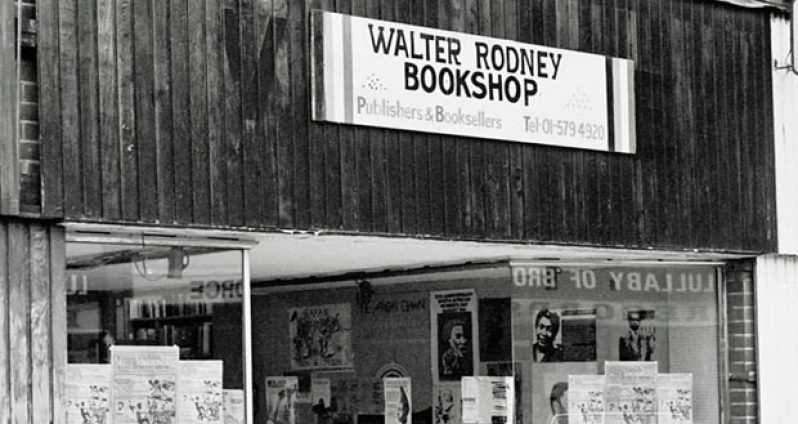Groundings with our Brothers and Sisters
(Extract of an interview with Eric Huntley, Georgetown, Guyana, 2015. Eric Huntley cofounded with his now deceased wife, Jessica, the Bogle-L’Ouverture Press, of which its first publication was ‘Groundings with my Brothers’ by Walter Rodney.)** PP (Petamber Persaud): You have moved from place to place, from country to country, from Guyana to the U.K. and back to Guyana in your four scores and six years. Congratulations on reaching that milestone.
** EH (Eric Huntley): Thank you.
** PP: In those four scores and six years, you have achieved a number of firsts, and in my book, your achievements should not go unnoticed. What is intriguing about your life is found in the title of this book, ‘Doing Nothing is Not an Option’; this is like a philosophy and it will be enlightening to find out whence cometh this philosophy.
** EH: It’s like making a cake. People have been making cakes before recipes. We [Jessica and Eric Huntley] have made the cake without the recipe. We have been confronted with certain situations which needed our attention. Other people have done the same thing. I don’t think it is a strange occurrence – we didn’t think about the consequences then. Now people are more concerned about payments of bills, mortgage payments, lots of obligations and other responsibilities. We did not take any of those things into consideration. If we did, nothing would have been  done.
done.
** PP: Still searching for that point of departure. Let go to your formative days in Guyana – you involvement in trade unionism, in the socio-political movement of this country.
** EH: I don’t think there was anything noticeable in our childhood days, both Jessica and I, we had ordinary childhood days – she grew up on the East Coast of Demerara (Kitty Village) and then in Howes Street (Charlestown) and I in Bent Street, near the Wai-Wai Yard, Bourda and then we ended up in New Amsterdam [Berbice] in our later days. But looking back now, maybe the ingredients came from our parents – the value they placed on education, not being allowed to play too much, get your book and read, and religion of course; being on your best behaviour, being respectful. There wasn’t any one reason…
** PP: They all came together to make that cake.
** EH: They all came together and allowed us to do a lot of crazy things…which had positive outcomes.
** PP: Crazy things like?
** EH: Like that time in Rosignol as a postman, I picketed the Princess of Athlone, the Queen’s cousin who was here with poster saying…Now, looking back, it was crazy…
** PP: What was the positive of that action?
** EH: I was saying to the people that this person was not deserving of our veneration – she was one of the exploitation class and is not deserving of our respect.
** PP: Another crazy thing before we move on.
** EH: At Rosignol Post Office again, I think it was the Coronation of Queen Elizabeth, I took down her photograph from the wall of the Post Office. But the Post Master at that time was like a father figure to me and he condescendingly rebuked me without reporting the matter.
** PP: Still on crazy things – was it a crazy thing for you to be joined in marriage with Jessica.
** EH: In my days and under the circumstances, it was. My father was a prison warder living in the good section of Bent Street and when he heard that Jessica was from Charlestown, he said that that was not the sort of company I ought to keep. That was the thinking then.
** PP: So there was opposition since then? How did you [both of you] overcome, conquer that?
** EH: Love. Love conquers all.
** PP: Was that a motif in your life – love for people and caring for other?
** EH: Not consciously but by becoming aware that people are not well off and if we lend them a helping hand, they would be able to live a better life. It was not a conscious decision but subconsciously it was making us more aware of the needs of people. You see, in our family there were teachers and social workers so….
** PP: Theme work: together you and Jessica made a wonderful team with significant achievements. What attracted you to Jessica?
** EH: That is a very good question ….Initially, it was a strong mind, a strong personality which was something to twin with – I wanted someone with those qualities to help me along the passage of time. So we worked well together, very supportive of each other and learning from each other.
** PP: Your first project together?
** EH: We published a journal for the Post Office Union when I was in Buxton. We bought a Gestetner machine from Bookers with my salary of $18 per month and we printed a journal, an unofficial journal of post office workers and Gestetner machine was later seized by the British Troops who raided our house so we only used it once or twice. Jessica and I worked on that project.
** PP: That was a spark; the beginning of something. What led [you and Jessica] down such a path? What was happening then?
** EH: In 1953, the constitution was suspended. We could not hold meetings – if there were four/five persons gathered at the street corner, you could be arrested, the police and the army were in control of the country, so having something, this forum, to voice your opinion was an activity which was illegal. Printing this journey was an illegal act but it was done in an in clandestine way.
** PP: We saw the reaction of the authority, what was the response by the workers?
** EH: It was an in-house magazine, it wasn’t intended for external use and it was most welcomed because there wasn’t any medium that kept postal workers in touch with each other. This was the first and only one.
** PP: So there was a need?
** EH: Yes, there was a need for it.
** PP: And then you moved from land to land – you moved to the U.K. There you were greeted by other forms of injustices and discriminations. Let’s talk about that move.
** EH: Jobs were available in London – it was after the World War II and it was a time of rebuilding, remedying the damage done to housing etc so jobs were available, not necessarily the jobs you would have liked but jobs were available. But one of the most difficult things was housing. People did not want to rent their places to Blacks.
** PP: Was there any redress to such a situation?
** EH: No, no redress. Schooling was another major difficulty once the children joined us.
** PP: So you and Jessica decided to do something.
** EH: We along with the community became aware of the fact that our children were being sent to schools for the educationally subnormal based on how you spoke the language – patois, broken English or creolese – our children were placed in schools for the disabled, mentally and physically. So we decided to teach our children especially on weekends, we taught them English, Maths and History – we started something like supplementary schooling which still exist today.
** PP: That was only one aspect of your work. The two of you started something else, something bigger, something just as important – you started a publishing house.
** EH: Yes, we did. And that was through Walter Rodney, another Guyanese, who was studying in Jamaica and who was banned when he returned to Jamaica after attending a conference in Canada. There were protests against the ban but to no avail so he went to Tanzania to work. And on his way there, we asked him to leave the speeches he had made and which were used to ban him…we published those speeches which give rise to ‘Groundings with my brothers’ and birth to Bogle L’Ouvertures Publications…
(Responses to this author – telephone (592) 226-0065 or email: oraltradition2002@yahoo.com)
by Petamber Persaud




.png)









